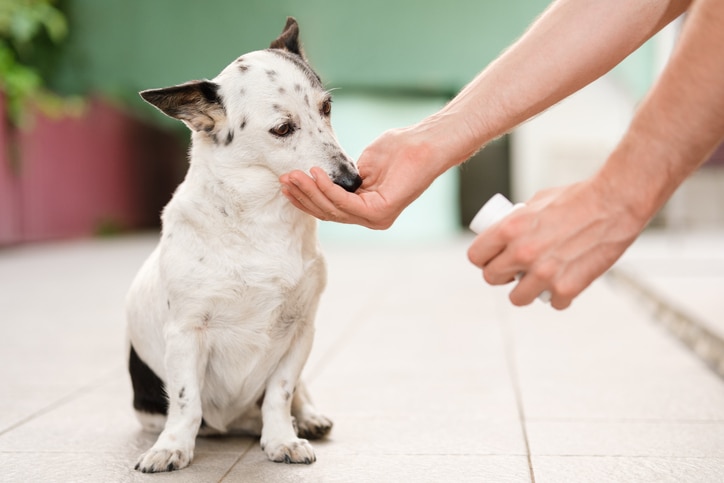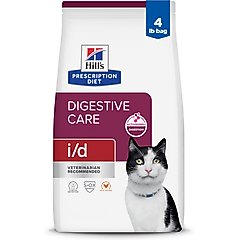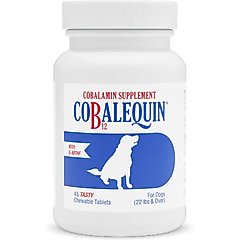What Is Vitamin B12 for Dogs?

Photo by Snizhana Galytska/iStock/Getty Images Plus
Vitamin B12, also known as cobalamin, is a water-soluble vitamin that is essential for neurologic function, intestinal function, red blood cell synthesis, and fatty acid and amino acid metabolism. While it’s usually included in complete and balanced dog foods, some dogs may benefit from additional vitamin B12 in their diet.
Let’s explore vitamin B12 benefits, what a deficiency looks like, and how to increase the vitamin when supplemental care makes sense.
Key Takeaways
- Vitamin B12 (cobalamin) supports your dog’s neurological health, digestion, and metabolism.
- Dogs eating complete and balanced diets typically don’t need B12 supplements unless diagnosed with a deficiency.
- B12 deficiency symptoms include chronic diarrhea, lethargy, weight loss, and neurological issues.
- B12 can be administered through veterinary-prescribed injections or oral supplements after proper diagnosis.
What Is Vitamin B12?
Vitamin B12 “is essentially used by every cell in the body,” says Carly Fox, DVM, a senior veterinarian at Schwarzman Animal Medical Center (AMC) in New York City.
“Dogs cannot metabolize vitamin B12, so they must ingest it in their diet or with supplementation,” Dr. Fox says. “Other B vitamins are found in both plant and animal tissue, but they cannot be stored in the liver for as long as B12, and are not as essential for such a wide variety of cell function.”
Sources of vitamin B12 include:
- Animal liver and kidneys: These are among the richest natural sources of B12. Beef liver, in particular, is high in cobalamin and is commonly used in pet diets and treats.
- Fish and shellfish: Salmon, sardines, tuna, and clams contain high levels of B12 and are occasionally found in commercial dog food.
- Meat and poultry: Chicken, turkey, and beef provide moderate amounts of B12, contributing to a balanced canine diet.
- Fortified dog food: Many high-quality commercial dog foods are fortified with B12 to ensure adequate intake, especially in dogs with digestive issues that impair nutrient absorption.
- Supplements: Veterinarians may prescribe oral or injectable B12 supplements for dogs with malabsorption disorders such as exocrine pancreatic insufficiency (EPI) or chronic gastrointestinal disease.
As with all other vitamins and supplements, never give your dog vitamin B12 without first discussing it with your veterinarian.
Benefits of Vitamin B12 for Dogs
Clinically normal dogs who eat commercial dog food usually do not need vitamin B12 supplements, Dr. Fox says.
“Animals do not benefit from extra B12 and will just excrete it in their urine,” she explains.
However, for dogs deficient in this essential vitamin, supplementing with B12 can have many benefits.
Dr. Fox says that if your pet has a demonstrated medical need for supplementation, correcting vitamin B12 levels can:
- Improve appetite
- Address certain gastrointestinal issues
- Allow for necessary weight gain
- Improve metabolic abnormalities (if present)
Vitamin B12 Deficiency in Dogs
Vitamin B12 deficiency in dogs is something a veterinarian can only diagnose through lab work and physical assessment. Abel Gonzalez, DVM, veterinarian and clinical director at Dutch, says deficiency signs can be subtle or severe.
They include:
- Chronic diarrhea
- Weight loss despite normal or increased appetite
- Lethargy, weakness, or low energy
- Muscle wasting (atrophy)
- Poor appetite
- Neurologic signs in advanced cases (e.g., confusion, tremors)
“If your dog—especially breeds predisposed to EPI or IBD [inflammatory bowel disease] like German Shepherds, Border Collies, Beagles—has ongoing GI issues, then a serum cobalamin test may be recommended,” Dr. Gonzalez says. “But don’t jump straight to B12. A thorough workup comes first, which includes fecal exams, baseline blood work, urinalysis, and nutritional history.”
If your pet is eating a homemade diet, an unregulated brand, or a raw diet, they may be deficient in vitamin B12, Dr. Fox says. Most commercial diets are properly formulated to ensure dogs get the required nutrients.
How Do I Add Vitamin B12 to My Dog’s Diet?
If a veterinarian determines your dog is deficient in vitamin B12, they may recommend supplementation. This should be done only through their specific recommendations and dosage instructions based on your dog’s unique needs.
Dr. Gonzalez says common ways to add vitamin B12 to your dog’s diet include:
- Canine B12 injections, prescribed and administered by a veterinarian. “These are best for dogs with EPI, IBD, or severe B12 deficiency. They’re usually given weekly, then monthly for maintenance,” Dr. Gonzalez says.
- Oral veterinary supplements, often between 250 mcg to 1000 mcg for dogs, per your veterinarian’s recommendation. These are suitable for mild cases or long-term support.
- Prescription GI-support diets, like Royal Canin GI Low Fat or Hill’s Prescription Diet i/d Digestive Care Chicken Flavor Dry Dog Food, which are fortified with extra B12.
- Natural animal-based foods, such as liver, sardines, and eggs that are rich in B12. However, Dr. Gonzalez says these usually aren’t sufficient for treating deficiencies.
Recommended Products
Best Vitamin B12 Supplements
Once you’ve spoken with your veterinarian and they’ve determined your pet needs vitamin B12 support, you can purchase over-the-counter oral supplements.
Some excellent options include Nutramax Cobalequin Chewable Tablets B12 Supplement for Medium to Large Dogs and Wonder Paws Vitamin B12 Cobalamin & Folate Supplement for Dogs.
Recommended Products
“Vitamin B12 deficiency takes months to correct with supplementation, so supplementing for a few days or even a few weeks will not result in adequate change,” Dr. Fox notes.
Your veterinarian can recommend how much vitamin B12 to give your dog, for how long, and whether cobalamin injections are necessary.
FAQs About Vitamin B12 for Dogs
Q: What foods are high in B12?
A: Foods high in vitamin B12 include organ meats like liver and kidney, especially from beef. Other rich sources are fish—such as salmon, sardines, and shellfish—along with meat, poultry, eggs, and dairy. Fortified dog foods and vitamin B12 supplements can also help your pup meet any B12 needs a veterinarian identifies.
Q: How long does it take for B12 to work in dogs?
A: Vitamin B12 supplementation can start improving a dog’s energy and appetite within a few days. However, the full benefits of vitamin B12 for dogs may take a few weeks, especially for chronic conditions. Consistent dosing and veterinary follow-up tests can help ensure you’re on the right track.








